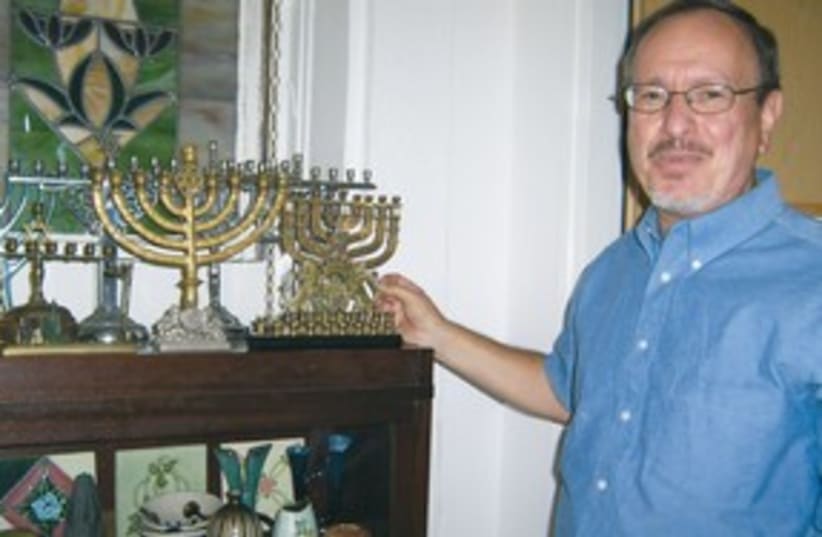PASTIMESTo celebrate their father’s aliya, the Sullum daughters bought their parents a membership to the Cinematheque, “one of the nicest things in Jerusalem” in Daniel’s opinion. “It’s a five-minute walk from our apartment, with a view of the Old City that I hope I never take for granted.”But his major passion is collecting. “What kept me busy in America was going to country auctions three or four times a week,” he says. “I enjoy learning the history of the items, knowing their backgrounds; the sense of discovery and excitement. At one auction, they were selling Palestine coins and nobody was bidding, so for $5 I got a poor condition Bar Kochba rebellion coin. I once found a Theodor Herzl rug among a bunch of velvet Elvises. For several dollars, I would buy boxes filled with newspapers, magazines and documents going back 10 to 200 years, detailing life years ago. I collected memorabilia of small-town Jewish businesses, a Main Street phenomenon that is disappearing in America.”The Sullums’ Jerusalem apartment is filled with the eclectic treasures Daniel shipped over, from menoras to watches, from paperweights to Fifties advertising posters. He’s adding pottery and metalware items acquired lately from the flea markets of Jaffa.“We moved a lot more things than we needed, but I hate to disperse the items,” he says, fingering a pile of stereoscope cards showing 3D shots of Palestine in the late 1800s. “I’m hoping that, with time, the children can take more of them.”ADVICE“I was lucky that the children turned out so well, and for having a very supportive wife,” Daniel says. “Otherwise I wouldn’t necessarily advise that anybody do what we did. It’s best if people can limit their time abroad, maybe three or four months a year.”A successful aliya, according to this new immigrant, “entails a love of Israel, knowing the reality of Israel and being economically prepared.”
Arrivals: The doctor is (finally) in the house
The Sullum family made aliya in stages with the daughters and wife coming first while Daniel built up his business.

PASTIMESTo celebrate their father’s aliya, the Sullum daughters bought their parents a membership to the Cinematheque, “one of the nicest things in Jerusalem” in Daniel’s opinion. “It’s a five-minute walk from our apartment, with a view of the Old City that I hope I never take for granted.”But his major passion is collecting. “What kept me busy in America was going to country auctions three or four times a week,” he says. “I enjoy learning the history of the items, knowing their backgrounds; the sense of discovery and excitement. At one auction, they were selling Palestine coins and nobody was bidding, so for $5 I got a poor condition Bar Kochba rebellion coin. I once found a Theodor Herzl rug among a bunch of velvet Elvises. For several dollars, I would buy boxes filled with newspapers, magazines and documents going back 10 to 200 years, detailing life years ago. I collected memorabilia of small-town Jewish businesses, a Main Street phenomenon that is disappearing in America.”The Sullums’ Jerusalem apartment is filled with the eclectic treasures Daniel shipped over, from menoras to watches, from paperweights to Fifties advertising posters. He’s adding pottery and metalware items acquired lately from the flea markets of Jaffa.“We moved a lot more things than we needed, but I hate to disperse the items,” he says, fingering a pile of stereoscope cards showing 3D shots of Palestine in the late 1800s. “I’m hoping that, with time, the children can take more of them.”ADVICE“I was lucky that the children turned out so well, and for having a very supportive wife,” Daniel says. “Otherwise I wouldn’t necessarily advise that anybody do what we did. It’s best if people can limit their time abroad, maybe three or four months a year.”A successful aliya, according to this new immigrant, “entails a love of Israel, knowing the reality of Israel and being economically prepared.”